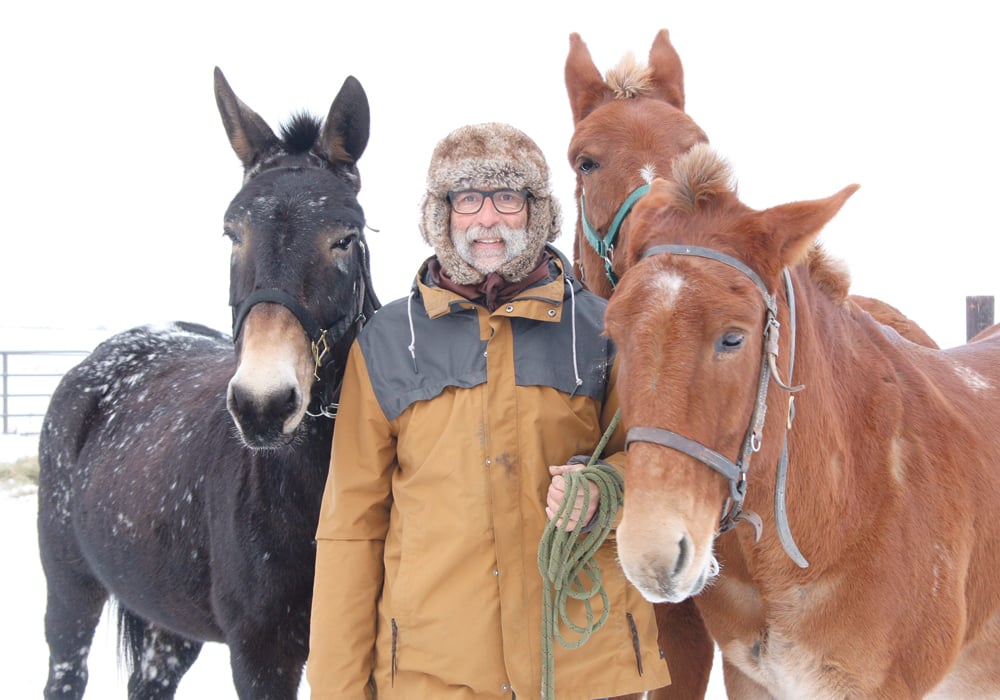AVONLEA, Sask. — Emile Brager is enjoying a day off the road, and so are his three mules.
Brager is sitting in Brad and Tori Meggison’s farm kitchen finishing breakfast and sipping tea, while Jojo, Jack and Sally eat hay in a corral.
The foursome tries to take a day off each week while they travel from Idaho to Grande Prairie, Alta., via many twists and turns to avoid highways.
They make about 25 kilometres each day and rely on the kindness of strangers, like the Meggison family, to put them up at night.
Read Also

Volatile temperatures expected for this winter
DTN is forecasting a lot of temperature variability in the Canadian Prairies this winter. Precipitation should be close to average.
“I never know where I will be,” Brager said.
He doesn’t seem worried about that. The retired physical education teacher who lives near the Ardeche Canyon in southern France, near Avignon, has made these long trips for years.
The first was a 14-month 10,000-km ride on horseback through Europe with his first wife.
“We had no tent, no cooking stuff, nothing,” he said.
“But we were young. My wife was not a great horsewoman but she was a very good traveller. We were a good team.”
They then did a four-year ride with three horses and a mule from the Strait of Magellan in southern Chile to Fairbanks, Alaska. Getting the animals across borders proved the most challenging of that 25,000-km trek.
A sailboat trip through the Pacific Ocean and the Mediterranean Sea challenged them with swirling strong winds.
“The Atlantic is much easier,” Brager said.
A bicycle trip through Mongolia, and a 10-month mule trip from Washington, D.C., to California and back to Yellowstone National Park added more kilometres to Brager’s log.
On July 1, 2019, he left Idaho, traveled through Montana and North Dakota, and in mid-December was making his way through the Canadian Prairies with plans to go to Saskatoon and Edmonton en route to Grande Prairie. From there, he will go back south through British Columbia and the Rockies to the United States.
It will take about two years.
As he travelled through southern Saskatchewan before Christmas, farmers and rural residents began opening their homes to him, and Facebook posts were alerting people along his proposed route.
Brager doesn’t want too much attention.
“I did not want to be on Facebook but now it is done,” he said, adding that it does make a first meeting with people easier.
“I look tired. I look, not so nice.”
What he means is he looks like someone bundled up and prepared for winter travel through Saskatchewan. Although he isn’t used to the cold, and people keep warning him about the weather, he said it came on slowly and allowed him to adjust.
“His experience and efficiency puts my mind at ease,” said Brad Meggison.
Tori, who with Brad operates Tori’s Performance Horses, said that even the mules have toques to protect their vascular ears. They are properly shod with an iron shoe and borium for added traction.
“These mules are well looked after,” she said.
Each day Brager packs two mules and rides one. He said three things are required to work with mules: relationship, relationship and relationship.
“If the mules understand what you want, it tries to do the best for you,” he said.
“Every horseman laughs about a mule but when they find a good one….”
Brager finds mules more intelligent and tougher than horses. They can work through bad food, heavy loads, long distances and lack of water, he said.
At the Meggisons, he took a couple of days to make some repairs, repack and rest. Wherever he stops, he tries to help with chores or do something to repay his hosts for their kindness.
He said people have stopped him along the road to make sure he is OK, or to ask if he needs something.
“There are a lot of very, very nice people here,” he said.
They all want to know why Brager would risk this trip during a prairie winter.
“I like these countries,” he said.
“I wanted to enjoy the landscape. I wanted to enjoy the wildlife. I wanted to share horsemanship in this country. Each one has something good to teach you. If it is not possible (to continue) I will quit.… I will just be frustrated, but better that than dead.”
Brager has five mules at home and has written a book, Techniques du Voyage a Cheval, for long-distance riders. He was president of a guild that included about 200 people from 11 countries who ride long distances.
He buys his mules at the beginning of each trip and must leave them behind when he goes home.
That can be tough because they do become like family, he said. But it’s too expensive to ship them. Jojo is 15, Jack is 11 and Sally is six, and their experience will make them valuable to their next owner.
Brager’s own family is at home in France, and he will return for April and May to spend time with his nine-year-old son and four-year-old daughter. He describes them as his main supporters. The children and their mother will return with him for part of the trip later on.
Brager said he keeps in contact with them, receiving photographs and news on his phone. While it’s hard to be away, he said in a way he isn’t much different than fathers who work in the military or offshore oil rigs and go away for months at a time to work at dangerous occupations.
“I can be pretty sure to come back home,” he said.
Meanwhile, he lives what he calls a teenage dream and hopes he is learning from and teaching others along the way.
















